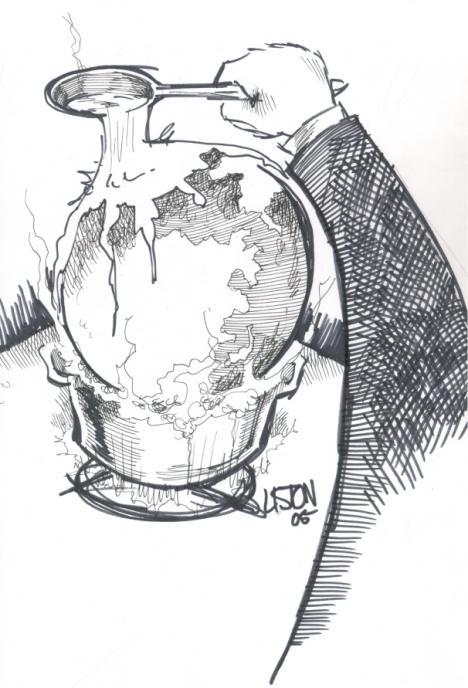By Joseph Kunkle

By Joseph Kunkle
The world is getting a bit warmer, and the fluctuations in the weather are becoming more extreme each year. The environmentalists call this the greenhouse effect: very warm and very humid. So warm and humid that even the most obtuse Republican could notice it.
Living organisms, like people, breathe oxygen and create carbon dioxide. Living plants breathe carbon dioxide and create oxygen.
The world populations of these two types of organisms are balanced by their relationship to one another. If you burn 20,000 acres of rain forest to make room for 20,000 people, there is no longer sufficient greenery to absorb the increased amounts of carbon dioxide they produce.The burning itself produces massive amounts of carbon.
As levels of carbon rise, indicating more animals than plants, earth’s atmosphere loses ozone thus diminishing the animal population through excess heat and increased solar radiation. This is how the earth corrects itself over time.The balance of plants and animals ensures that there will always be life on earth.
What all this means is that because of human overpopulation and deforestation, there is more carbon in the atmosphere chewing away at the ozone layer.
The increase in solar radiation will eventually kill off the carbon producing organisms, thus giving the oxygen producers like plants a chance to catch up.
In 1997, more than 165 nations around the world signed a document binding them to decreasing carbon emissions called the Kyoto Protocol.These nations promised to reduce greenhouse gasses to a certain percentage below the emission levels as they existed in 1990. Starting in 2008, the deadline for nations to reach this goal is 2012.
The Kyoto Protocol is presently stalled due to U.S. refusal to sign. The Bush administration has allegedly found certain flaws that they would like to see corrected prior to signing.
In acumen that could have come from any multinational corporate boardroom, the Bush administration is unwilling to sign the protocol because it would require massive conversion of coal-fired power plants to other, cleaner fuels like natural gas or even Gasp! solar or wind power (perish the thought).
The U.S. has vast coal deposits that are still in the ground waiting to be burned in outdated power plants.
This coal is someone’s merchandise and upgrading the plants would reduce its value. Further, upgrading these plants would seriously erode the economic bottom line.
The U.S. has more automobiles than anybody. Though lagging behind the power plants as generators of carbon emissions, car exhaust is catching up proportionate with the increase in population. Suffice it to say that the U.S. might be the world’s worst eco-villain.
There is a provision within the protocol for trading of emission reduction units (ERUs) that represent tons of carbon emissions.
These units will allow industrialized nations like the U.S. to buy excess units from underdeveloped nations without much industry of their own.In other words, if an industrial nation needs to reduce emissions by twenty percent but can only reduce it by 2 percent, the other 18 percent can be purchased from nation Y that has no industry. A good potential income source for the third world, but it would mean much higher prices for energy in the U.S.
Is global warming bad? Big business is encouraged by the news that there will be major fuel savings for summer shipping using the Northwest Passage over Canada and Russia. There is open ice there for the first time in recorded history. There are walrus, seals and polar bears that face extinction, but commerce marches on.
That is the real bottom line here; energy prices are expected to rise exponentially with or without the Kyoto Protocol, so if it is going to rise anyway, would any politician survive the public outcry of $5+ per gallon at the gas pump?
The Bush administration won’t sign because they don’t want to commit to anything, preferring to “self-police” without being forced to do it by the protocol.
United States, Incorporated, and its subsidiary, the multinational corporation, will comply eventually, but only when the customers and stockholders, in other words, the U.S. citizens and voters, make enough of an outcry to affect the bottom line. Not for cheaper gas, but for a cleaner environment.
Regardless of the cost of energy or corporate profits, it is people, not corporations that will pay the ultimate price.






